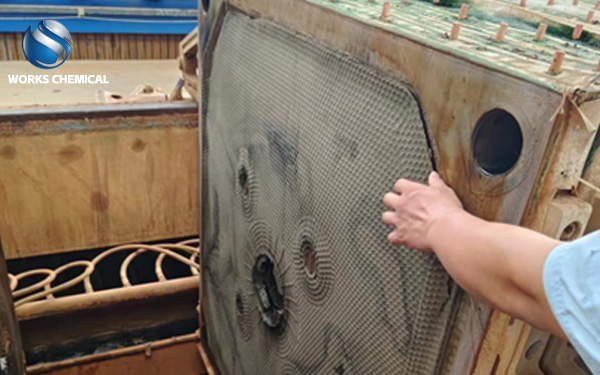
The high water content of municipal sludge is a common problem, and the selection of suitable sludge dewatering agents is very important to reduce the water content of sludge. The following is a detailed analysis of municipal sludge dewatering agents:

Limitations of traditional dewatering agents
Limited effect: Although traditional sludge dewatering agents such as polyaluminum chloride, lime, ferric chloride, etc., can separate part of the water in the sludge, it can not achieve the effect of deep dewatering of the sludge.
High operating costs: The use of these traditional medicines requires a large amount of water to dissolve the medicine, increasing the operating costs.
Equipment corrosion: lime and other agents are corrosive, will seriously corrode the dehydration equipment, shorten the service life of the equipment.
Sludge dehydration is not complete: the conditioned sludge is easy to stick to the filter cloth, block the filter cloth, and affect the dehydration effect.
Two, the advantages of new dehydration agents
In order to overcome the limitations of traditional sludge dewatering agents, a new sludge dewatering agent (sludge conditioner, sludge synergizer) has appeared on the market, and its main components include inorganic compounds, sludge surface structure modifier, degreaser, wall breaking agent, sludge surface treatment agent, sludge stripping agent, etc. These new agents have the following advantages:
Deep dewatering: the new sludge dewatering agent (sludge conditioner, sludge synergist) can effectively reduce the moisture content of the sludge and make the sludge reach the deep dewatering state. The moisture content can be reduced to 35%~55%, or even lower, with good sludge reduction effect.
Improve mud press efficiency: Combined with plate and frame filter press, the new sludge dewatering agent can greatly improve mud press efficiency and shorten the sludge press cycle.
No corrosion to the equipment: the new sludge dewatering agent (sludge conditioner, sludge synergist) does not contain corrosive ingredients, has no corrosion effect on the dewatering equipment, and is conducive to extending the service life of the equipment.
Reduce operating costs: Due to the small amount of addition, there is no need to add corrosive substances such as lime, and the filter cloth is non-adhesive, reducing the frequency of dewatering equipment to replace the filter cloth, thus saving operating costs.
Three. Precautions for drug selection
Selection according to sludge properties: different sources and properties of sludge have different requirements for dewatering agents. Therefore, when selecting agents, it is necessary to fully understand the composition, concentration, viscosity and other properties of the sludge in order to select the most suitable agent.
Determine the dosage through the test: The dosage of the agent has a direct impact on the dehydration effect. Therefore, before formal use, the optimal dosage should be determined through a small sample test to ensure that the treated sludge achieves the expected dewatering effect.
Considering the cost of the agent: the new sludge dehydrating agent (sludge conditioner, sludge enhancer) has advantages in reducing the water content and improving the mud pressing efficiency. When selecting a drug, it is necessary to consider factors such as drug cost, treatment effect and operating cost.
Conclusion
In summary, the problem that the municipal sludge moisture content is high and can not be reduced can be solved by choosing the appropriate dewatering agent. The new sludge dewatering agent (sludge conditioner, sludge synergist) has the advantages of deep dewatering, improving mud pressing efficiency, no corrosion to equipment and reducing operating costs, and is the preferred agent in municipal sludge treatment. In the selection of agents, it is necessary to fully consider the characteristics of the sludge, the dosage and the cost of the agent to ensure the dual optimization of the treatment effect and economy.